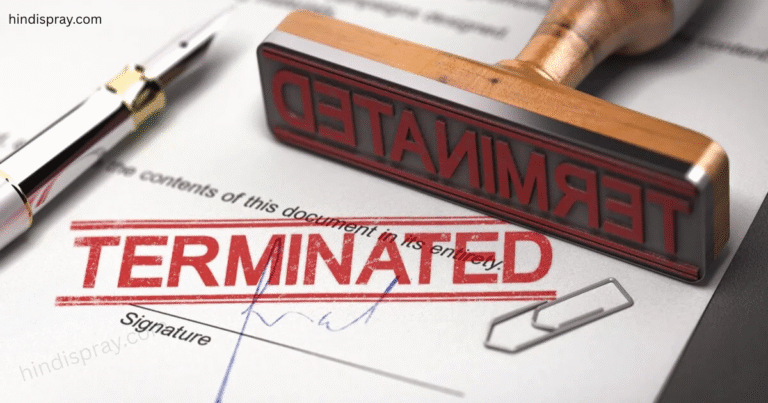Insurance policies are contractual agreements designed to provide financial protection against risks and uncertainties. However, these contracts don’t always last forever. Termination of an insurance policy is a critical aspect that policyholders must understand, as it determines when and how a policy can end — either voluntarily or involuntarily. Whether you’re an individual policyholder or a business owner, knowing the intricacies of policy termination can help you avoid unexpected lapses in coverage and potential financial loss.
This guide explores the various aspects of insurance policy termination, including types, reasons, procedures, implications, and how to manage the process effectively.
What is Termination in Insurance?
Definition of Policy Termination
Termination in insurance refers to the cancellation or end of an insurance contract before its normal expiration date. It can be initiated by either the insurer or the insured and may occur due to a variety of reasons, ranging from non-payment of premiums to fraud or mutual agreement.
Termination vs. Lapse vs. Expiry
- Termination is the active ending of a policy before its designated end date.
- Lapse occurs when a policy ends automatically, typically due to non-payment of premiums.
- Expiry happens when a policy naturally reaches the end of its coverage period.
Understanding these distinctions is essential to managing your coverage effectively.
Types of Policy Termination
Voluntary Termination
This occurs when the policyholder chooses to end the coverage. Reasons might include:
- Switching to a better policy
- Selling the insured asset (e.g., a car or home)
- No longer needing the coverage
- Financial constraints
In voluntary termination, the insurer is typically notified in advance and may offer a refund for the unused premium portion, if applicable.
Involuntary Termination

This type of termination is initiated by the insurer and can be due to:
- Non-payment of premiums
- Fraud or misrepresentation
- Excessive or frequent claims
- Violation of policy terms or conditions
Involuntary terminations may have serious consequences, including difficulty obtaining future coverage.
Common Reasons for Policy Termination
1. Non-Payment of Premiums
Failure to pay premiums on time is one of the most common reasons for policy termination. Most insurers offer a grace period, usually 15–30 days, to make a late payment before terminating the policy.
2. Material Misrepresentation
Providing false or misleading information during the application process — such as hiding pre-existing medical conditions in health insurance — can lead to immediate termination if discovered.
3. Fraudulent Claims
Attempting to deceive the insurer through inflated or false claims is considered fraud and can result in not only termination but also legal action.
4. Risk Profile Changes
Significant changes to the insured risk (like modifying a home without informing the insurer) can cause the insurer to reassess or terminate the policy if the risk becomes unacceptable.
5. Regulatory or Legal Reasons
Sometimes policies may be terminated due to changes in laws, regulations, or insurer licensing in certain regions.
The Termination Process: What to Expect
For Policyholders
When terminating a policy voluntarily:
- Submit a Written Request – Contact your insurer in writing to request cancellation.
- Provide Effective Date – Indicate the desired date of termination.
- Return Documents – Some insurers may require return of physical policy documents.
- Review Refund Options – If you prepaid premiums, check if you’re eligible for a pro-rated refund.
For Insurers
When insurers initiate termination:
- Notice Requirement – Most jurisdictions require insurers to give written notice (typically 10 to 30 days in advance).
- Stated Reason – The reason for termination must be disclosed.
- Right to Appeal – In some cases, policyholders have a right to appeal or reinstate coverage by remedying the issue (e.g., paying overdue premiums).
Consequences of Policy Termination
Loss of Coverage
The most immediate consequence is that you are no longer protected against the risks covered under the policy. This can leave you exposed to serious financial loss.
Difficulty Obtaining Future Coverage
If your policy was terminated due to non-payment or fraud, future insurers may view you as high risk. This can lead to higher premiums or denial of coverage.
Legal and Financial Repercussions
Driving without auto insurance or operating a business without liability coverage can result in fines, license suspension, or lawsuits.
Refund or Penalty
Depending on the insurer and the type of policy, you may:
- Receive a pro-rata refund for the unused portion of your premium
- Be charged a short-rate cancellation fee, which slightly penalizes early termination
Policy Reinstatement After Termination
What is Reinstatement?
Reinstatement is the process of restoring a terminated policy to active status, usually within a specified grace or reinstatement period.
Conditions for Reinstatement
To reinstate a policy, insurers typically require:
- Payment of outstanding premiums and fees
- Proof of insurability (for health or life insurance)
- Signed statement or application
Not all terminations are eligible for reinstatement, especially if fraud or misrepresentation was involved.
Special Cases: Termination in Different Types of Insurance
Auto Insurance
Auto policies may be terminated for reasons like DUI offenses, too many claims, or failure to maintain your vehicle. Most states require a minimum notice period and may mandate SR-22 forms for reinstatement.
Health Insurance
Under the Affordable Care Act (ACA), health insurers cannot terminate coverage due to illness. However, termination for non-payment or fraud is still allowed.
Life Insurance
Life insurance policies can lapse or terminate due to non-payment or policyholder’s request. Many policies offer a reinstatement clause within 3 to 5 years if certain conditions are met.
Homeowners Insurance

Common causes of termination include high claims frequency, failure to maintain the property, or living in high-risk areas (flood, wildfire zones). Insurers typically give 30 days’ notice.
Tips to Prevent Policy Termination
Set Up Automatic Payments
Avoid termination due to missed payments by enrolling in auto-pay or setting up reminders.
Communicate Changes Promptly
Notify your insurer about any changes in risk, such as moving, changing vehicles, or renovations.
Keep Records of Payments and Communications
In disputes over termination, documentation can help you prove compliance or argue for reinstatement.
Shop for Policies Before Cancelling
If you plan to switch insurers, ensure that new coverage is in place before terminating your current policy to avoid gaps in coverage.
Legal Protections for Policyholders
Regulatory Oversight
Insurance is regulated at the state level in most countries. Regulators ensure that insurers follow fair practices in policy terminations.
Right to Appeal
You often have the right to appeal a termination or file a complaint with a consumer protection agency.
Notice Requirements
Insurers are generally required to provide written notice of cancellation with adequate time for the policyholder to respond or make alternate arrangements.
Also Read: Insurance Savings : What You Need To Know
Conclusion
Insurance policy termination can be a disruptive event — but it doesn’t have to be a crisis. By understanding the different types of termination, reasons they occur, and the process involved, you can take steps to prevent unwanted cancellations and make informed decisions about your coverage. Whether you’re choosing to end a policy or facing termination from your insurer, knowing your rights, responsibilities, and options can make all the difference.
Remember, the best defense against unexpected termination is proactive policy management. Review your policies regularly, communicate with your insurer, and ensure your premiums are paid on time. And in situations where termination is unavoidable, understand the steps you need to take to secure new coverage promptly.
FAQs
1. Can my insurance company cancel my policy without warning?
No, in most jurisdictions, insurance companies are required by law to provide written notice of cancellation, usually between 10 to 30 days before the policy is terminated.
2. What is the difference between cancellation and non-renewal?
Cancellation occurs during the policy term, while non-renewal means the insurer chooses not to renew your policy once it expires. Both actions must usually be accompanied by proper notice.
3. Will I get a refund if I cancel my insurance early?
You may receive a pro-rata refund for the unused portion of your premium. However, some insurers apply a short-rate penalty, reducing the refund amount.
4. Can I switch insurance companies without a gap in coverage?
Yes, but make sure the new policy starts before the old one ends. It’s advisable to overlap policies by a day or two to avoid any lapse in coverage.
5. What should I do if my policy is terminated unfairly?
You can appeal the decision, contact your state’s insurance regulator, or file a complaint with a consumer protection agency. Always request a written explanation from your insurer.

